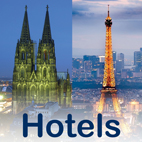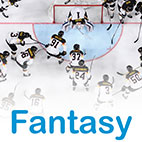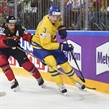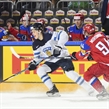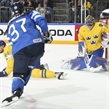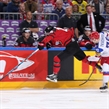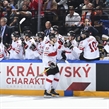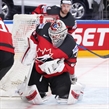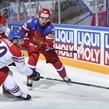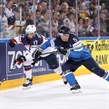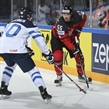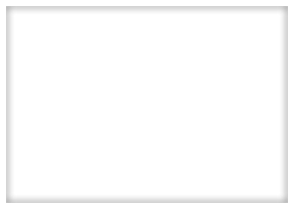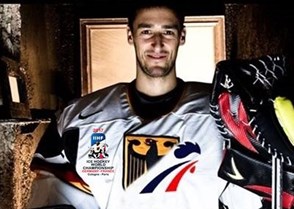Info
- Tournament Format
- Player Entry
- Eligibility
- Arenas
- Directions Cologne
- Useful information Paris
- Hospitality Cologne
- Together for 2017
- Mascots - Asterix & Obelix
- Official Ambassadors
- TV Listings
- World Ranking
- Past Medallists
- Volunteers Cologne
- Volunteers Paris
- Coaching Symposium
- Hall of Fame
- Tourism in Paris
- Media accreditation
- Contacts
Tournament Format
The 16 teams are divided into two groups for the Preliminary Round with the top-four teams of each group advancing to the quarter-finals.
The top-four ranked teams of each group advance to the quarter-finals that will be normally be played cross-over. The first-place team in each preliminary-round group plays the fourth-place team of the other group, while the second-place team plays the third-place team of the other group. 1A-4B, 2A-3B, 1B-4A, 2B-3A.
- If France is qualified for the Quarter Finals they will play the 20:15 QF (Game 60) in Paris
- If Germany is qualified for the Quarter Finals they will play the 20:15 QF (Game 59) in Cologne
- If Germany and France will play each other in the Quarter-Finals, no cross-overs, pairings would be A1-A4, B1-B4, A2-A3, B2-B3.
- If Germany and/or France are not qualified for the Quarter Finals, then the highest ranked team from that/each Group of the Preliminary Round will play the late game in either or both sites (Game 59 and/or 60) in Cologne or Paris.
The winning teams advance to the semi-finals. Both semi-final games will be played at LANXESS arena in Cologne. The highest ranked team at the conclusion of the Preliminary Round will play the 15:15 semi-final game (Game 61) in Cologne.
The winning teams of the semi-final games advance to the gold medal game while the semi-final losing teams play for bronze.
Relegation format
The overall bottom ranked two teams will be relegated to the 2018 IIHF Ice Hockey World Championship Division I Group A.
The 2018 IIHF Ice Hockey World Championship will consist of 16 teams including the team of the organizing member national association, thus Denmark cannot be among the two relegated teams.
The teams promoted to the 2018 IIHF Ice Hockey World Championship will be the top-two teams of the 2017 IIHF Ice Hockey World Championship Division I Group A.
Three Point System
For all games points shall be awarded as follows:
- 3 points for the winning team at the conclusion of regulation time
- 1 point for both teams at the conclusion of regulation time if the game is tied
- An additional point earned for the team winning the game in a 5-minute overtime period, or the Penalty-Shot Shootout Procedure if the teams are still tied following conclusion of the overtime period
- 0 points for the team losing the game in regulation time
Overtime Operations
If a game is tied at the end of regulation time, a five-minute overtime period shall be played. The teams will change ends for the overtime period. The game will end when the five minutes has expired or when a goal is scored; the scoring team will be declared the winner. If no goal is scored in the overtime period then the Game Winning Shots Procedure will apply. All overtime periods of any IIHF game shall be played with each team at the numerical strength of three (3) skaters and one (1) goalkeeper for games of the preliminary round.
Overtime procedure in Play-Off Games:
- In case of a tie at the conclusion of regulation time in a Relegation Playoff, Placement Playoff, Quarter Final, Semi Final and Bronze Medal Game, there will be a 10-minute sudden-death overtime period played, following a three-minute intermission.
- The teams will change ends for the overtime period.
- The overtime period shall be played with each team at the numerical strength of four (4) skaters and one (1) goalkeeper.
- The team, which scores a goal during this period is the winner.
- In the Gold Medal game there will be a 20-minute sudden-death overtime period, following a 15-minute intermission during which the ice will be resurfaced.
- The teams will change ends.
- The overtime period shall be played with each team at the numerical strength of five (5) skaters and one (1) goalkeeper.
- The team which scores a goal during this period is declared winner.
- If no goal is scored during the sudden-death overtime, there will be Penalty-Shot Shootout according to the Penalty-Shot Shootout Procedure.
Penalty-Shot Shootout Procedure
If no goal is scored in the overtime period then the Penalty-Shot Shootout (PSS) procedure will apply. The following procedure will be utilized:
- Three different shooters from each team - five in playoff and medal games - will take alternate shots, until a decisive goal is scored.
- If the game is still tied after three shots (respectively five in playoff and medal games) by each team, the PSS will continue with a tie-break shoot out by one player of each team, with a reversed shooting order. The same or new players can take the tie-break shots.
- The same player can also be used for each shot by a team in the tie-break shoot-out.
- Only the decisive goal will count in the result of the game.
- Shots will be taken at both ends of the ice. The area of the ice to be used will be dry scraped.
- A coin toss will determine which team takes the first shot, with the winner of the toss having the choice whether his team will shoot first or second.
- Any player whose penalty was not over when overtime ended cannot take the shots and must stay in the penalty box or in the dressing room.
- Once named, players may only be replaced in the event of injury or penalty.
- The substitute stand-by player is placed last in the shooting order.
- The goalkeepers will defend the same goal, as determined by the Referee. The goalkeepers from each team may be changed after each shot.
- The players of both teams will take the shots alternately until a decisive goal is scored.
- The decisive goal will be credited to the player who scored and to the goalkeeper concerned.
Tie breaking formula
The tie-breaking system for two teams with the same number of points in a standing will be the game between the two teams, the winner of the game taking precedence.
Due to the fact that the three-point system does not allow a game to end in a tie, then the following tie breaking procedure is applicable when three or more teams are tied in points in a Championship standing.
Should three or more teams be tied on points, then a tie breaking formula will be applied as follows, creating a sub-group amongst the tied teams. This process will continue until only two or none of the teams remain tied. In the case of two tied teams remaining, the game between the two would then be the determining tie-breaker as the game could not end as a tie. In the case of none of the teams being tied, the criteria specified in the respective step applies.
Step 1: Taking into consideration the games between each of the tied teams, a sub-group is created applying the points awarded in the direct games amongst the tied teams from which the teams are then ranked accordingly.
Step 2: Should three or more teams still remain tied in points then the better goal difference in the direct games amongst the tied teams will be decisive.
Step 3: Should three or more teams still remain tied in points and goal difference then the highest number of goals scored by these teams in their direct games will be decisive
Step 4: Should three or more teams still remain tied in points, goal difference and goals scored then the results between each of the three teams and the closest best-ranked team outside the sub-group will be applied. In this case the tied team with the best result (1. points, 2. goal difference, 3. more goals scored) against the closest best ranked-team will take precedence
Step 5: Should the teams still remain tied, then the results between each of the three teams and the next highest best-ranked team outside the sub-group will be applied.
Step 6: Should the teams still remain tied after these five steps have been exercised then Sport considerations will be applied and the teams will be ranked by their positions coming into the Championship (seeding).
Final Ranking / World Ranking
The gold medal game and bronze medal game will determine the final ranking for the top-4 teams. The eliminated teams from the preliminary round plus the losing teams of the quarter-finals will be ranked following their positions in the groups preceding the quarter-final round.
The final ranking will follow the following procedure:
1. Higher position in the group,
2. Higher number of points,
3. Better goal difference,
4. Higher number of goals scored for,
5. Better seeding number
The IIHF World Ranking will be produced after the IIHF Ice Hockey World Championship. It is based on the rankings of the four most recent IIHF Ice Hockey World Championships and of the last Olympic men’s ice hockey tournament (including qualification tournaments).
Click here for more information on the IIHF World Ranking system.
More information
Click here to download the IIHF’s Rule Book and Sport Regulations.
Player Entry
- The teams submit the names of the participating players at the first Championship Directorate.
- The maximum number of players allowed on a Team Registration Form at the beginning of the World Championship is 22 skaters and 3 goalies. The minimum is 15 skaters and 2 goalies.
- At the first Directorate meeting, the teams must name at least the minimum number of 15 skaters and 2 goalkeepers. The players entered must be present at the championship venue by the time of the Directorate meeting.
- The remaining players up to the allowed maximum of 22 + 3 must be submitted for players' control two hours before any of the following championship games. Players can be added throughout the tournament until the roster is full.
- During a game, a team may enter (dress) 20 skaters and 2 goalkeepers on the Official Game Sheet, with the emergency goalkeeper standing by if a goalie entered to the Official Game Sheet is unable to play.
Eligibility
To play in the IIHF World Championship, the Olympic ice hockey tournament and the qualifications to these competitions, players must fulfill the following qualification requirements:
- Each player must be under the jurisdiction of an IIHF member national association
- Each player must be a citizen of the country he represents.
Acquiring a new national eligibility (The ‘two-year’ case)
When a player has changed his citizenship or has acquired another citizenship and wants to participate for the first time in an IIHF competition representing his new country he must:
- Prove that he has participated for at least two consecutive hockey seasons and 16 consecutive months (480 days) in the national competitions of his new country after his 10th birthday during which period he has neither transferred to another country nor played ice hockey within any other country.
- Have an international transfer card (ITC) that shows the transfer to the national competition of his new country and which was approved and dated at least two years before the start of the IIHF competition in which he wishes to participate.
Change of national eligibility (The ‘four-year’ case)
A player, who has previously participated in IIHF competition, can switch national eligibility (but only once in a player's life) if:
- He is a citizen of the new country of his choice.
- He has participated for at least four consecutive years (1460 days) in the national competitions of his new country, during which period he has neither transferred to another country nor played ice hockey within any other country and has not played for his previous country in an IIHF competition during this four year period.
- He has an international transfer card (ITC) that shows the transfer to the national competition of his new country and which was approved and dated at least four years before the start of the IIHF competition in which he wishes to participate.
Arenas
The 2017 IIHF Ice Hockey World Championship will be held for the 3rd time in Cologne and the 2nd time in Paris. The tournament days are from 5th to 21st of May in 2017. The preliminary round will be played in both cities. The top-four teams in each preliminary round group will advance to the Quarter-Finals. The Quarter-Finals will be played across the groups, if Germany and France play each other in the Quarter-Finals, no cross-overs. The Semi-Finals, the Bronze Medal and Gold Medal Game will be played in Cologne.
LANXESS arena, Cologne
Situated in the heart of Cologne, Germany‘s media capital in the River Rhine Valley, the LANXESS arena offers a new dimension for indoor events. With a future oriented concept it operates one of the largest, sophisticated and most frequented multi-purpose arenas in Europe. The spacious glass construction, which is towered over by a 76-metre-high steel structure, the LANXESS arena offers well over 170 various events per year with a compact program of superstars, large events from the international music, show, sports scene and also business events from 10 to 20,000 visitors. The LANXESS arena also has the ideal prerequisites for staging events of all kinds by a variable room portioning concept.
Total space: 83 700 sq m
Space indoor: 4 000 sq m
Space outdoor: 10 000 sq m
Exhibition space: 6 000 sq m
Number of people indoor: 20,000
Ice Hockey: 18,500
AccorHotels Arena, Paris
The AccorHotels Arena is the largest multi-purpose arena in France with a seating capacity of 13,437 for hockey, and 12 million inhabitants in a radius of 100 km. The arena has been renovated in 2015.
This arena is one of the most popular sports-culture centres sought after by many international artists, games, concerts and other events. In 2017 it will also welcome host to the 25th IHF Men’s World Championship of Handball.
----
One of the five biggest arenas in the world
30 different setups (sport events, concerts)
130 events by year
Entirely renovated in October 2015.
-----
Total space renovated: 80 000 sq m
Hospitalities area: 4 000 sq m
Number of people indoor: 20,300 seats
Ice Hockey setup: 13,437
Directions Cologne
Location & Route Map
The LANXESS arena in Cologne is located in the district Deutz – east of the Rhine. You can get a detailed overview of the Location including all bus and rail stops in the Route Map.
Car, Fan coach or Caravan
Address of the LANXESS arena for GPS:
Willy-Brandt-Platz, 50679 Cologne (50°56'18.4"N 6°58'58.5"E)
Car parks & parking fees
All Car parks are signposted – maximum vertical clearance is 1.90m.
Parking fee is 1.30€ per hour. There is also the possibility to pay the so-called “Arena-Tarif” of 5.50€, before the beginning of the game at the cash machines.
Fan coaches
Fan coaches can use the bus car park „Kuhweg Köln“. This public car park is free of charge and open 24/7. You can find more information here.
Wohnmobile
For fans who travel with caravans, we recommend the Reisemobilhafen An der Schanz and the Campingplatz in Poll.
Further Information
Aktuelle Verkehrslage auf den Autobahnen in NRW
Public Transport
Regional & long-distance traffic
For visitors who travel to Cologne by train, the railway station „Köln Messe/Deutz“ is the easiest destination. The LANXESS arena can be reached on foot in about 5 minutes.
Travelers, whose train stops at “Köln Hauptbahnhof” (Cologne Central Station), have the opportunity to take the S-Bahn to “Bahnhof Messe/Deutz”
S-Bahn
The train station „Bahnhof Köln Messe/Deutz“ can be reached with the S-Bahn lines S6, S11, S12, S13 & S19.
Streetcar/Subway & Bus
The stations „Köln Deutz/Messe LANXESS arena“, „Köln Deutz Technische Hochschule“ and „Köln Gummersbacher Straße“ are served by the lines 1, 3, 4 & 9 of the city tramp (Streetcar & Subway) and the bus lines 150, 153 & 156. All 3 stations are within a few walking minutes to the LANXESS arena.
Further information
http://www.bahn.de
http://www.kvb-koeln.de
By plane
The airport „Cologne/Bonn“ is 12km south of the LANXESS arena and can be reached by taxi or train in approximately 15 minutes. The S-Bahn lines S13 & S19 run directly between Cologne/Bonn airport and the station „Bahnhof Messe/Deutz“.
Further information
Useful information Paris
From 5 to 18 May, the AccorHotels Arena in Paris welcomes the IIHF 2017 Ice Hockey World Championship. The competition will host 30 games between 8 of the 16 best nations in the world: Canada, Finland, Czech Republic, Switzerland, Belarus, Norway, France and Slovenia. Whether you will be attending matches or just want to enjoy the festive atmosphere around the site, here are some practical information.
Opening hours and access conditions
- During the whole competition, a safety perimeter will be set up around the AccorHotels Arena. Security checks (visual inspection of the bags and opening of the coats) will be done to get in. Tickets holders and non-holders will be able to get through it. According to the games affluence, the access will open between 90 and 120 minutes before the kick-off. Arrive early, to give you extra time to get through security.
- Final access to the AccorHotels Arena will then take place after a second security check (palpation) and an electronic tickets control. WARNING: a certain number of objects will be prohibited inside the enclosure. Click here to download the list.
- After each match, all spectators will have to get out of the Arena. For spectators holding a ticket for the next game, a specific access will be dedicated to them in order to reach directly the large hall in which they will be controlled again.
- The site will close at the end of the last game at 11PM maximum.
- Throughout the competition, tickets will be available on the AccorHotels Arena website. Tickets can also be purchased directly at the AccorHotels Arena ticket offices within the security perimeter to come to the AccorHotels Arena
Heading to the AccorHotels Arena
- Train
The AccorHotels Arena is located less than 900 m from the SNCF train stations: Paris Gare de Lyon, Paris-Austerlitz, and Paris-Bercy.
- Public transportation
RER Lines A and D: Station "Gare de Lyon"
METRO Lines 14 and 6: Station "Bercy" / Line 1 Station "Gare de Lyon"
BUS Lines 24 and 87 Station "Gare de Bercy" / Lines 20, 63, 65 and Balabus Station "Gare de Lyon"
A basic T+ ticket (métro, bus, RER, tramway) costs €1,90.
Children under 4 years old travel for free. More information on www.ratp.fr
- Vél’ib
Vélib’ is Paris’ flexible bike service!
Choose between fixed-price daily (€1,70) and weekly tickets (€8) for as many 30-minute journeys as you wish. More information on www.velib.paris
- Autolib’
Autolib’ is an electric car sharing service. Autolib' offers 1,084 electric car stations in Paris agglomeration with 5,935 charging points. More information on www.autolib.eu/en/
- Taxi
You will find several taxi terminals allowing you to be droped off near the AccorHotels Arena: Boulevard de Bercy, Quai de la gare, and Gare de Lyon.
- Car (be careful, traffic is very difficult in Paris, especially during the event period around the Arena) – Adress : 8 Boulevard de Bercy, 75012 Paris
During the event, restricted circulation will be arranged depending on two
configurations :
- Normal configuration : from 05 to 18 may (excepted 15, 17 et 18 may)
- High configuration : 15 and 18 may
In high configuration, only people presenting a ticket parking permit obtained in advance will be granted access to boulevard de Bercy et quai de Bercy.
Click here to download the traffic restrictions in pdf format.
Hospitality Cologne
Please find here all hospitality offers for Cologne during the 2017 IIHF Ice Hockey World Championship.
Together for 2017
Organizing the 2017 IIHF Ice Hockey Word Championship together, Germany and France have broken new ground. For the first time two countries jointly applied for the tournament. They have planned and organized it together, putting in practice every day its motto “Together for 2017”.
Sweden and Finland also organized the 2012 and 2013 IIHF Ice Hockey Word Championships together. They had not applied together but the tournaments were joined together later.
Germany and France were chosen at the IIHF Annual Congress in 2013, a symbolic year. 50 years before the so called Elysee-Agreement had been signed, also known as German-French treaty of friendship. 18 years after World War II had ended the former enemies set the foundation for the process of reconciliation and friendship.
The organization of the 2017 IIHF Ice Hockey World Championship has been coined by the spirit of the friendship between the two nations. The collaboration works perfectly, the countries even complement each other. Luc Tardif, president of the French Ice Hockey Federation (FFHG) and vice president of the Organizing Committee of the 2017 IIHF Ice Hockey World Championship, once summed it up it in pretty words: “German flair for organization plus French fantasy – it’s a perfect mixture.”
In this millennium Germany organized in 2001 and 2010 IIHF Ice Hockey World Championships. In Paris, the last IIHF Ice Hockey World Championship took place in 1951.
Mascots - Asterix & Obelix
Asterix and Obelix, the indomitable Gauls and two main characters of the world-famous Asterix comic series, act as mascots of the 2017 IIHF Ice Hockey World Championship, jointly organized by Germany and France in Cologne and Paris. Everybody knows Asterix and Obelix. Many people ask however what these heroes of a comic book have to do with ice hockey.
The successful battle that the famous Gauls fight against the superior Roman Empire should encourage the smaller teams on paper not to accept the supremacy of the leading ice hockey nations and to challenge them bravely.
Luc Tardif, president of the French Ice Hockey Federation (FFHG) and vice president of the Organizing Committee of the 2017 IIHF Ice Hockey World Championship, once said: “For our fans and the teams which participate in the IIHF Ice Hockey World Championship, Asterix and Obelix serve as role models to show: Nothing is impossible.” Anyhow, Asterix and Obelix are sportsmen. In Volume 12 of their adventures Asterix participates in the Olympic Games in Ancient Greece. There of course he goes without the magic potion of the druid Getafix!
Asterix and Obelix are very well-liked since many years in France and Germany which are clearly the strongest markets for the adventures of our 2 heroes. The global production of the 36 volumes so far amounts to more than 370 million copies. They have been translated into more than 111 languages and dialects, inter alia “Kölsch”, the dialect of Cologne.
Official Ambassadors
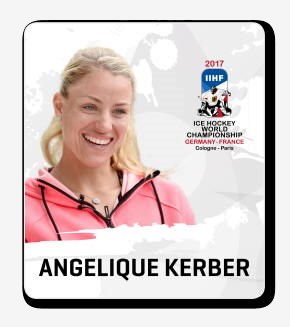
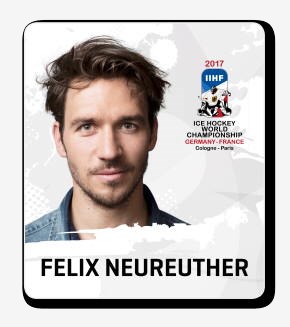
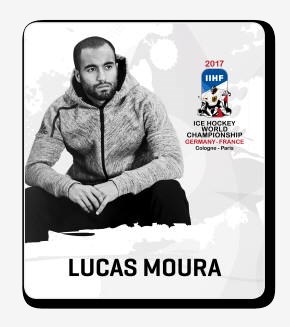
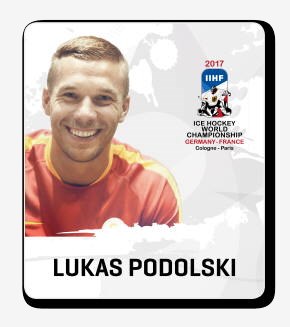
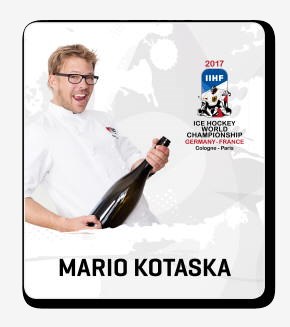
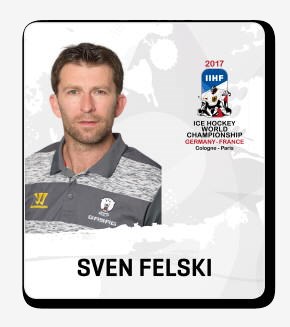
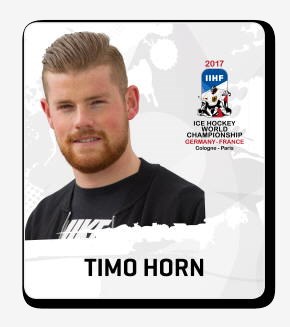
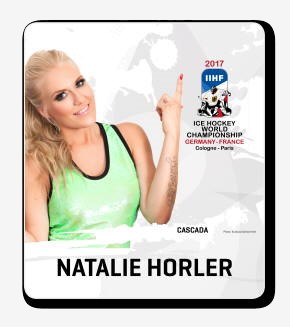
TV Listings
The 2017 IIHF Ice Hockey World Championship can be followed in many countries all over the world.
Click here to find your local broadcaster.
In countries where games are not broadcast you can follow them on the live stream.
World Ranking
The 2017 IIHF Men's World Ranking takes into account the placings at the World Championships between 2014 and 2017 as well as the 2014 Olympic Winter Games.
Click here for more information on the IIHF World Ranking system.
2017 IIHF Men's World Ranking
| Ranking | Country | Points | Movement |
| 1 | Canada | 3225 | 0 |
| 2 | Russia | 3105 | 0 |
| 3 | Sweden | 3080 | 2 |
| 4 | Finland | 3060 | -1 |
| 5 | USA | 2980 | -1 |
| 6 | Czech Republic | 2900 | 0 |
| 7 | Switzerland | 2705 | 0 |
| 8 | Germany | 2660 | 2 |
| 9 | Norway | 2535 | 2 |
| 10 | Belarus | 2535 | -1 |
| 11 | Slovakia | 2530 | -3 |
| 12 | Latvia | 2520 | 0 |
| 13 | France | 2505 | 1 |
| 14 | Denmark | 2495 | -1 |
| 15 | Slovenia | 2305 | 0 |
| 16 | Austria | 2205 | 1 |
| 17 | Kazakhstan | 2200 | -1 |
| 18 | Italy | 2180 | 0 |
| 19 | Hungary | 2095 | 0 |
| 20 | Poland | 2030 | 0 |
| 21 | Korea | 2000 | 2 |
| 22 | Ukraine | 1925 | 0 |
| 23 | Japan | 1905 | -2 |
| 24 | Great Britain | 1850 | 0 |
| 25 | Lithuania | 1755 | 0 |
| 26 | Croatia | 1675 | 0 |
| 27 | Estonia | 1650 | 1 |
| 28 | Netherlands | 1625 | -1 |
| 29 | Romania | 1565 | 0 |
| 30 | Serbia | 1410 | 1 |
| 31 | Spain | 1375 | -1 |
| 32 | Belgium | 1280 | 0 |
| 33 | Australia | 1225 | 3 |
| 34 | Iceland | 1215 | 1 |
| 35 | Israel | 1115 | -1 |
| 36 | Mexico | 1110 | -3 |
| 37 | China | 1100 | 0 |
| 38 | New Zealand | 1015 | 0 |
| 39 | DPR Korea | 885 | 1 |
| 40 | Bulgaria | 825 | -1 |
| 41 | Turkey | 815 | 1 |
| 42 | Luxembourg | 740 | 1 |
| 43 | South Africa | 725 | -2 |
| 44 | Hong Kong | 635 | 0 |
| 45 | Georgia | 455 | 2 |
| 46 | United Arab Emirates | 370 | 0 |
| 47 | Bosnia & Herzegovina | 295 | -2 |
| 48 | Chinese Taipei | 220 | NEW |
Past Medallists
| IIHF Ice Hockey World Championships | ||||
| Year | Gold | Silver | Bronze | Venue |
| 1920 | Canada | USA | Czechoslovakia | Antwerp (Olympics) |
| 1924 | Canada | USA | Great Britain | Chamonix (Olympics) |
| 1928 | Canada | Sweden | Switzerland | St. Moritz (Olympics) |
| 1930 | Canada | Germany | Switzerland | Chamonix, Berlin, Vienna |
| 1931 | Canada | USA | Austria | Krynica |
| 1932 | Canada | USA | Germany | Lake Placid (Olympics) |
| 1933 | USA | Canada | Czechoslovakia | Prague |
| 1934 | Canada | USA | Germany | Milan |
| 1935 | Canada | Switzerland | Great Britain | Davos |
| 1936 | Great Britain | Canada | USA | Garmisch-Partenkirchen (Olympics) |
| 1937 | Canada | Great Britain | Switzerland | London |
| 1938 | Canada | Great Britain | Czechoslovakia | Prague |
| 1939 | Canada | USA | Switzerland | Basle, Zurich |
| 1940-1946 No championships (World War II) | ||||
| 1947 | Czechoslovakia | Sweden | Austria | Prague |
| 1948 | Canada | Czechoslovakia | Switzerland | St. Moritz (Olympics) |
| 1949 | Czechoslovakia | Canada | USA | Stockholm |
| 1950 | Canada | USA | Switzerland | London |
| 1951 | Canada | Sweden | Switzerland | Paris |
| 1952 | Canada | USA | Sweden | Oslo (Olympics) |
| 1953 | Sweden | FR Germany | Switzerland | Zurich, Basle |
| 1954 | Soviet Union | Canada | Sweden | Stockholm |
| 1955 | Canada | Soviet Union | Czechoslovakia | Krefeld, Dortmund, Cologne |
| 1956 | Soviet Union | USA | Canada | Cortina (Olympics) |
| 1957 | Sweden | Soviet Union | Czechoslovakia | Moscow |
| 1958 | Canada | Soviet Union | Sweden | Oslo |
| 1959 | Canada | Soviet Union | Czechoslovakia | Prague, Bratislava |
| 1960 | USA | Canada | Soviet Union | Squaw Valley (Olympics) |
| 1961 | Canada | Czechoslovakia | Soviet Union | Geneva, Lausanne |
| 1962 | Sweden | Canada | USA | Colorado Springs, Denver |
| 1963 | Soviet Union | Sweden | Czechoslovakia | Stockholm |
| 1964 | Soviet Union | Sweden | Czechoslovakia | Innsbruck (Olympics) |
| 1965 | Soviet Union | Czechoslovakia | Sweden | Tampere |
| 1966 | Soviet Union | Czechoslovakia | Canada | Ljubljana |
| 1967 | Soviet Union | Sweden | Canada | Vienna |
| 1968 | Soviet Union | Czechoslovakia | Canada | Grenoble (Olympics) |
| 1969 | Soviet Union | Sweden | Czechoslovakia | Stockholm |
| 1970 | Soviet Union | Sweden | Czechoslovakia | Stockholm |
| 1971 | Soviet Union | Czechoslovakia | Sweden | Berne, Geneva |
| 1972 | Czechoslovakia | Soviet Union | Sweden | Prague |
| 1973 | Soviet Union | Sweden | Czechoslovakia | Moscow |
| 1974 | Soviet Union | Czechoslovakia | Sweden | Helsinki |
| 1975 | Soviet Union | Czechoslovakia | Sweden | Munich, Dusseldorf |
| 1976 | Czechoslovakia | Soviet Union | Sweden | Katowice |
| 1977 | Czechoslovakia | Sweden | Soviet Union | Vienna |
| 1978 | Soviet Union | Czechoslovakia | Canada | Prague |
| 1979 | Soviet Union | Czechoslovakia | Sweden | Moscow |
| 1981 | Soviet Union | Sweden | Czechoslovakia | Gothenburg, Stockholm |
| 1982 | Soviet Union | Czechoslovakia | Canada | Helsinki, Tampere |
| 1983 | Soviet Union | Czechoslovakia | Canada | Dusseldorf, Dortmund, Munich |
| 1985 | Czechoslovakia | Canada | Soviet Union | Prague |
| 1986 | Soviet Union | Sweden | Canada | Moscow |
| 1987 | Sweden | Soviet Union | Czechoslovakia | Vienna |
| 1989 | Soviet Union | Canada | Czechoslovakia | Stockholm, Sodertalje |
| 1990 | Soviet Union | Sweden | Czechoslovakia | Berne, Fribourg |
| 1991 | Sweden | Canada | Soviet Union | Turku, Helsinki, Tampere |
| 1992 | Sweden | Finland | Czechoslovakia | Prague, Bratislava |
| 1993 | Russia | Sweden | Czech Republic | Dortmund, Munich |
| 1994 | Canada | Finland | Sweden | Bolzano, Canazei, Milan |
| 1995 | Finland | Sweden | Canada | Stockholm, Gavle |
| 1996 | Czech Republic | Canada | USA | Vienna |
| 1997 | Canada | Sweden | Czech Republic | Helsinki, Turku, Tampere |
| 1998 | Sweden | Finland | Czech Republic | Zurich, Basle |
| 1999 | Czech Republic | Finland | Sweden | Oslo, Lillehammer, Hamar |
| 2000 | Czech Republic | Slovakia | Finland | St. Petersburg |
| 2001 | Czech Republic | Finland | Sweden | Cologne, Hanover, Nuremberg |
| 2002 | Slovakia | Russia | Sweden | Gothenburg, Karlstad, Jonkoping |
| 2003 | Canada | Sweden | Slovakia | Helsinki, Turku, Tampere |
| 2004 | Canada | Sweden | USA | Prague, Ostrava |
| 2005 | Czech Republic | Canada | Russia | Vienna, Innsbruck |
| 2006 | Sweden | Czech Republic | Finland | Riga |
| 2007 | Canada | Finland | Russia | Moscow, Mytishi |
| 2008 | Russia | Canada | Finland | Quebec City, Halifax |
| 2009 | Russia | Canada | Sweden | Berne, Zurich-Kloten |
| 2010 | Czech Republic | Russia | Sweden | Cologne, Mannheim, Gelsenkirchen |
| 2011 | Finland | Sweden | Czech Republic | Bratislava, Kosice |
| 2012 | Russia | Slovakia | Czech Republic | Helsinki, Stockholm |
| 2013 | Sweden | Switzerland | USA | Stockholm, Helsinki |
| 2014 | Russia | Finland | Sweden | Minsk, Belarus |
| 2015 | Canada | Russia | USA | Prague, Ostrava |
| 2016 | Canada | Finland | Russia | Moscow, St. Petersburg |
| 2017 | Sweden | Canada | Russia | Cologne, Paris |
|
Notes: |
||||
| All Olympic Ice Hockey Tournaments between 1920 and 1968 also counted as World Championships. | ||||
| In the Olympic years 1980, 1984 and 1988, no IIHF World Championships were staged. | ||||
| IIHF Ice Hockey European Championships | ||||
| Year | Gold | Silver | Bronze | Venue |
| 1910 | Great Britain | Germany | Belgium | Les Avants |
| 1911 | Bohemia | Germany | Belgium | Berlin |
| 1912 | Championship annulled | |||
| 1913 | Belgium | Bohemia | Germany | Munich |
| 1914 | Bohemia | Germany | Belgium | Berlin |
| 1915-1920 No championships (World War I) | ||||
| 1921 | Sweden | Czechoslovakia | (only two teams) | Stockholm |
| 1922 | Czechoslovakia | Sweden | Switzerland | St. Moritz |
| 1923 | Sweden | France | Czechoslovakia | Antwerp |
| 1924 | France | Sweden | Switzerland | Milan |
| 1925 | Czechoslovakia | Austria | Switzerland | Strbske Pleso, Stary Smokovec |
| 1926 | Switzerland | Czechoslovakia | Austria | Davos |
| 1927 | Austria | Belgium | Germany | Vienna |
| 1929 | Czechoslovakia | Poland | Austria | Budapest |
| 1932 | Sweden | Austria | Switzerland | Berlin |
| Notes: | ||||
| Berlin 1932 was the last separate IIHF European Championship event. | ||||
| European Championships medals were awarded to the European participants of the IIHF World Championships until 1991. |
||||
Volunteers Cologne
Volunteers Paris
Coaching Symposium
The 2017 IIHF International Coaching Symposium is organized by the International Ice Hockey Federation (IIHF), the German Ice Hockey Association (DEB) and the 2017 IIHF Ice Hockey World Championship Organizing Committee.
Well-known international experts will speak in this symposium and provide you with information on current issues concerning long-term player development, leadership and off-ice training. This will cover most different areas of coaching studies and will create an interesting event.
The Symposium will be held in English with simultaneous translation (German).
Date: 13 – 14 May 2017
Deadline for Registration: 15 April 2017
Location / Hotel
Cologne Marriott Hotel
Johannisstrasse 76-80
50668 Cologne – Germany
Meeting-Room „Forum 2“
Cologne Marriott Hotel (Courtyard)
Dagobertstrasse 23
50668 Cologne – Germany
For longer stay, please contact the hotels directly. Day of arrival for participants with accommodation booked is the 12th May 2017 (three nights).
Service
- Attendance to all sessions
- Valid for prolongation of coaches license in Germany
- Lunches and coffee breaks during the conference
- Registration package
- Conference documents
- One ticket each for the World Championship games:
- #41 Italy vs. Germany (Saturday, 13 May / 20:15 GMT +2 / LANXESS Arena)
- #43 Slovakia vs. USA (Sunday, 14 May / 16:15 GMT + 2 / LANXESS Arena)
For any questions concerning IIHF International Coaching Symposium, please contact the following address: [email protected]
Program
Click here for the program.
Speakers
Tom Renney
Thomas “Tom“ Renney is a Canadian ice hockey coach who has been the Head Coach of the Vancouver Canucks as well as the Edmonton Oilers. Currently he is the President and CEO of Hockey Canada.
Dr. Stephen Norris
Dr. Stephen Norris is a sport scientist, currently „performance conversationalist“ to Sport, Business and Military groups.
Paul Carson
Paul Carson is the Vice President of Hockey Development with Hockey Canada. Paul Carson co‐authored a series of 11 children’s illustrated hockey books entitled “Hockey the NHL Way”.
Tommy Boustedt
Tommy Boustedt is the General Manager of the Swedish Ice Hockey Association.
John Whitesides
John Whitesides, the Director of Health, Fitness and Wellness of the Boston Bruins, is in his 16th season as the Strength and Conditioning Coach.
Don Granato
Don Granato is currently Assistance Coach with the Wisconsin Badgers men's hockey team. Don Granato was previously Head Coach of the “USA Hockey National Team Development Program”.
Uwe Krupp
Uwe Krupp, former Head Coach of the German national team, is currently the Head Coach of the DEL team Eisbaren Berlin. He was the first German ice hockey player to win the Stanley Cup. In 2017 he will be inducted into IIHF Hall of Fame.
Alpo Suhonen
Alpo Suhonen has worked as a coach during five decades. In his early years he led Finland to World Juniors silver and bronze medals before coaching the men’s national team in the ‘80s. He had coaching stints in North America including becoming head coach of the Chicago Blackhawks and in Switzerland. Since 2012 he is the Sports Director of the Austrian Ice Hockey Association.
Jussi-Pekka Kurtti
A strength and conditioning as well as nutrition coach with the main focus on maximizing athletic performance and optimizing sport-specific body composition. Has served hundreds of clients which include many high-performance athletes from multiple sports, including ice hockey.
Melody Davidson
Melody Davidson has unrivalled expertise in the field of women’s ice hockey with Team Canada’s GM for the past decade. She has also worked as head coach with Canada’s national teams both on the U18 and the senior levels. She led her country to gold medal at both the 2006 and 2010 Winter Olympic Games. She has been a long-time member of the IIHF’s Women Committee.
Participation fee
- Accommodation excluded 479,00 EUR
- Accommodation included (double room, 2 participants) 549,00 EUR
- Accommodation included (single room) 649,00 EUR
Registration
Hall of Fame
Former players Saku Koivu, Uwe Krupp, Angela Ruggiero, Joe Sakic and Teemu Selanne, along with builder Dieter Kalt will be inducted to the IIHF Hall of Fame.
Former Great Britain national team player and coach Tony Hand has been selected to receive the Richard “Bibi” Torriani Award.
French ice hockey executive and former player and coach Patrick Francheterre will be given the Paul Loicq Award.
The 2017 IIHF Hall of Fame Induction Ceremony will take place in Cologne, Germany on 21 May, the final day of the 2017 IIHF Ice Hockey World Championship.
Click here for a complete list of all of the IIHF Hall of Fame’s honoured members.
Dieter Kalt
b. Klagenfurt, Austria, 29 July 1941
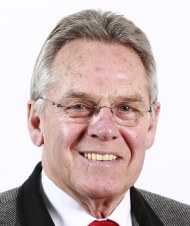 A star player during the 1960s in the Austrian league, Dieter Kalt has been the very face of Austrian hockey for half a century and more, first on the ice, and then in an executive capacity.
A star player during the 1960s in the Austrian league, Dieter Kalt has been the very face of Austrian hockey for half a century and more, first on the ice, and then in an executive capacity.
On the national stage, Kalt led Klagenfurt to championships in five seasons during a six-year period – 1966, 1967, 1970, 1971, and 1972. In all, he played for Klagenfurt from 1957 to 1967 and again from 1969 to 1980. He also played for Graz from 1967 to 1969 while finishing his law degree.
Internationally, Kalt first represented his country at the 1962 World Championship in Colorado Springs (B pool). He played in every major IIHF event from 1962 to 1972 except the 1963 Worlds and captained the WM team in 1969 and 1972. As well, he wore the “C” for Austria at the 1968 Olympics, his second.
After retiring, Kalt worked as a referee and later a coach. In 1976, he started working with the Austrian Ice Hockey Federation (OEHV) as a team leader in charge of sport development.
From 1996 to 2016, he was President of the Austrian Ice Hockey Federation, and, upon retiring in 2016, Kalt was named Honorary President by his federation. Kalt is also a long-time member of the Austrian Olympic Committee.
His son, Dieter Kalt, Jr., had an extraordinary career in his own right. Internationally, the younger Kalt played at 13 World Championships between 1993 and 2007 as well as three successive Olympics (1994, 1998, 2002).
Saku Koivu
b. Turku, Finland, 23 November 1974
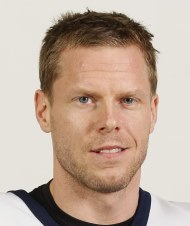 Perhaps the greatest competitor that Finnish ice hockey has ever produced, Saku Koivu was a player of skill, heart, dedication, and honour. In a career that lasted nearly two decades both internationally and in the NHL, Koivu captained his team to many great moments.
Perhaps the greatest competitor that Finnish ice hockey has ever produced, Saku Koivu was a player of skill, heart, dedication, and honour. In a career that lasted nearly two decades both internationally and in the NHL, Koivu captained his team to many great moments.
Although he was part of Suomi’s bronze medal at the 1994 Olympics, and a silver medallist a few months later at the World Championship, it was a year later that Koivu first achieved something historic.
Playing on a line with Jere Lehtinen and Ville Peltonen at the 1995 World Championship, the trio led Finland to its first ever gold medal at that event. All three players on the team’s top line were named to the All-Star Team, and Koivu was named IIHF Directorate Award Best Forward.
That fall, Koivu left Finnish league hockey to begin an historic career with the Montreal Canadiens. As a rookie he scored 20 goals and was a brilliant addition to the team, displaying great skating speed, soft hands with the puck, and great two-way play.
It was in 1998 at the first NHL-led Olympics that Koivu wore the “C” for the first time, and when Finland defeated Wayne Gretzky and Canada, 3-2, in the bronze-medal game, Koivu’s legend only increased.
In 1999, he was given the honour of wearing the “C” for the Canadiens, the first-ever European captain for the storied franchise. It was a letter that adorned his “chandail” for ten years. Only the great Jean Beliveau wore it as long in team history.
Koivu’s career was punctuated by injury, and each and every time he fought back to resume playing at the highest level. He suffered bad injuries to his knees and legs as well as an eye injury that has affected his vision to this day, but nothing was as traumatic as when he was diagnosed with non-Hodgkin’s lymphoma. He missed almost all of the 2001/02 season, including the 2002 Olympics, but as always he battled back and returned to a standing ovation.
Koivu’s participation in the World Championship was as faithful as any player of his era. His credo was simple – if I can play, I will. He took Finland to another gold-medal game in 1999, this time against the Czech Republic. The best-of-two format culminated with a sudden-death overtime, where Jan Hlavac’s goal forced Suomi to settle for a hard-fought silver.
In 2004, at the World Cup of Hockey, Koivu again wore the “C” and again took his team to the championship game, this time losing 3-2 to Canada. And in 2006, at the Turin Olympics, Finland capped another historic run to the finals before a narrow 2-1 loss to arch-rivals Sweden.
In all, Koivu participated in 11 top competitions for Finland, winning eight medals. In the NHL, he finished his career in Anaheim alongside Teemu Selanne before retiring in 2014. He played in some 1,124 regular-season games as well as 79 in the playoffs.
Never the biggest man on ice by height or weight, Koivu was a giant and legend in terms of skill, sportsmanship, and dedication. He battled through injuries and opponents with equal determination, and he achieved glory for his country as few players have in the game’s history.
Uwe Krupp
b. Cologne, West Germany (Germany), 24 June 1965
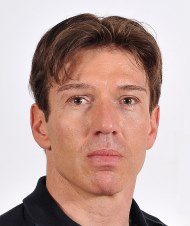 It’s difficult enough making an impact at the top levels of hockey, but it is doubly so for players outside the “Big Six,” because their chances of crafting an impressive resume through medals is greatly diminished.
It’s difficult enough making an impact at the top levels of hockey, but it is doubly so for players outside the “Big Six,” because their chances of crafting an impressive resume through medals is greatly diminished.
Yet it is easy to name Uwe Krupp as the finest hockey player Germany has ever produced. A defenceman of imposing size, he was nevertheless a fluid skater who brought the puck out of his zone with fluid consistency.
As a result, legendary coach Scotty Bowman wasn’t disappointed that Krupp failed to register a point at the 1983 World Junior Championship. And he wasn’t disappointed that Krupp’s offensive production with Kolner Haie was similarly low. Bowman saw behind the numbers, and while GM of the Buffalo Sabres selected Krupp 214th overall at the 1983 draft.
Krupp stayed in Germany for three more seasons, but in 1986, after a brief but impressive showing at the World Championship, he was ready to try his hand at the pro level in North America. Although he played several games with the Sabres that year he spent most of the 1986/87 season in Rochester where he helped the Americans win the Calder Cup. After that, Krupp was an NHLer for the next 14 seasons, making history for himself and for Germany.
At 198 cm (6’6”) tall, he was the tallest player in the league for several seasons, but, impressively, mobility was never his weakness. Krupp played for the Sabres for the better part of six seasons before being traded to the New York Islanders where he continued to develop his offensive skills.
It was at the 1994 draft that Krupp’s career took a turn that would change his life. He was traded to the Quebec Nordiques with a first-round draft choice for Ron Sutter and a first-rounder. Just one year later, the Nordiques, a Stanley Cup contender, moved from Quebec to Denver, Colorado. The team reached its zenith by advancing to the Cup finals against Florida, an expansion team making its first appearance in the finals.
The Avalanche won the first three games by scores of 3-1, 8-1, and 3-2, but game four was goalless through 60 minutes of regulation time. The fourth period and fifth period were also played without a goal, but at 4:31 of the sixth period Krupp scored to give the Avs the Cup and cement his own legacy. He was the first German to score a Cup-winning goal and the first German to win the Cup.
In addition to a brief appearance at the 1998 Olympics, Krupp was part of another Cup-winning team under Bowman, this time in Detroit in 2002. By this time back injuries had severely compromised his career, and he retired soon after.
Krupp later returned to Germany to coach the junior and senior teams, leading the national program from the 2006 Olympics through the 2011 World Championship. He started as a German pioneer in the NHL, made history during his career in North America, and returned home to teach a new generation of players what he had learned.
Angela Ruggiero
b. Panorama City, California, USA, 3 January 1980
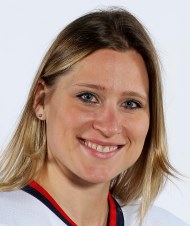 From the school room to the board room to the arena, no woman has commanded the respect and accomplished as much as Angela Marie Ruggiero. Playing hockey as a teenage girl in California was an unlikely starting point for someone who has reached such lofty heights, but Ruggiero always thought big and aimed higher.
From the school room to the board room to the arena, no woman has commanded the respect and accomplished as much as Angela Marie Ruggiero. Playing hockey as a teenage girl in California was an unlikely starting point for someone who has reached such lofty heights, but Ruggiero always thought big and aimed higher.
She made her debut with the U.S. National team as a 17-year-old at the 1997 Women’s World Championship in Kitchener, Ontario, and by the time she announced her retirement, on 28 December 2011, she had produced a career worthy of the Hall of Fame.
Unlike many female players of her era, Ruggiero was big and strong. As a defenceman she used those skills at both ends of the ice and became the cornerstone of the American blueline corps for more than a decade.
Without a doubt, her greatest thrill came early. The youngest player on Team USA at the 1998 Olympics – the inaugural event for women’s hockey – Ruggiero helped her team stun Canada in the gold-medal game.
As special as that moment was, though, she experienced frustration repeatedly at the Women’s Worlds, finishing runner-up time and again. But in 2005, the final game another Canada-United States showdown, it was Ruggiero’s goal in the penalty-shot shootout that proved the margin of victory, the first Women’s Worlds gold for the Americans.
Ruggiero went on to win three more World Championships, and her name was a virtually constant presence at every end-of-tournament all-star team or Directorate Award announcement.
By 2011, though, having accomplished all that she could on ice – and feeling the effects of injuries to her 31-year-old body – Ruggiero retired from the game. She was, however, only starting her career in sport administration.
Indeed, education was always more important to her than hockey. She attended Harvard University from 2000 to 2004 where she graduated cum laude with an undergrad degree in government while also being named the Patty Kazmaier Award winner in 2004 as the best female hockey player in the NCAA.
Ruggiero later earned a master’s degree in sports management from the University of Minnesota as well as an MBA from Harvard Business School. In 2010, Ruggiero was named to the evaluation commission for the 2018 Olympics, one of only eleven athletes who would inspect facilities for prospective hosts for those Olympic Winter Games.
This proved only a starting point for her involvement with the IOC at an executive level. In 2013, she was named to the IIHF Athletes’ Committee, and in 2016 she was promoted from Vice-Chair to Chair of the IOC’s Athletes’ Commission as well as being named to the executive board of the IOC.
She was inducted into the Hockey Hall of Fame in Toronto in 2015. A champion player on the ice, Ruggiero is proving to be equally successful off of it in the name of promoting and enhancing sport worldwide.
Joe Sakic
b. Burnaby, British Columbia, Canada, 7 July 1969
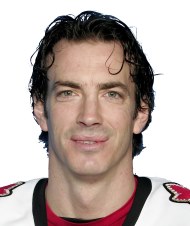 The 12th member of the IIHF’s Triple Gold Club, Joe Sakic was a winner from the beginning of his career to the end. A leader and gentleman, he also possessed the most effective wrist shot in the game and was admired and respected by teammates and opponents equally.
The 12th member of the IIHF’s Triple Gold Club, Joe Sakic was a winner from the beginning of his career to the end. A leader and gentleman, he also possessed the most effective wrist shot in the game and was admired and respected by teammates and opponents equally.
Sakic started his NHL career in 1988 after being drafted 15th overall by Quebec the previous year. The team had wanted him to play right away, but he insisted on taking another year in the WHL with Swift Current, during which time he helped Canada win gold at the 1988 World Junior Championship in Moscow. At season’s end, he was named the best junior player in Canada.
He quickly established himself as a powerful forward whose quick release made his shot so effective. He scored 23 goals as a rookie and a year later he eclipsed the 100-point plateau for the first of six times in his career.
What was also obvious to all who knew him was his quiet leadership abilities. Not a screamer by nature, he nonetheless inspired those around him to raise their level of play when it mattered most. Fiercely competitive yet even-tempered, he was a leader in the Steve Yzerman mold, and in 1992 Sakic was named captain of the Nordiques. He would wear the “C” for the next 17 years of the franchise’s history.
Sakic played in two World Championships early in his NHL career, winning silver in 1991 and gold three years later, the first for Canada since 1961. The Nordiques, however, moved to Colorado in 1995, and in the first season won the Stanley Cup. That was a career year for “Gentleman Joe,” who had 51 goals, 69 assists, and a career high 120 points. In the playoffs, he scored the winning goal in six of the team’s 16 wins and was named Conn Smythe Trophy winner.
The Avalanche won the Cup again in 2001, but it was a gesture by Sakic in celebration that remains in the mind’s eye. Instead of raising the Cup high over head, as is tradition for the Cup-winning captain to do, Sakic swooped the trophy low and handed it to Ray Bourque, the former Boston Bruins defenceman who had never been able to win the trophy with the Bruins in nearly two decades.
Sakic was also part of Canada’s historic 2002 Olympic team that won gold for the first time in half a century. He scored a pivotal goal in the gold-medal game and was named tournament MVP for his brilliant play in Salt Lake. He won the World Cup in 2004 with Canada and two years later captained his country at the Turin Olympics.
By the time he retired in 2009, Sakic had won everything there is to win. His NHL statistics were staggering: 1,378 games played, 625 goals, 1,106 assists. He had his number 19 retired by the Avs the year he retired and was inducted into the Hockey Hall of Fame in 2012.
Sportsman, victor, leader, Joe Sakic was one of the game’s legends.
Teemu Selanne
b. Helsinki, Finland, 3 July 1970
 Gordie Howe is known as Mr. Hockey. Glenn Hall is called Mr. Goalie. It is only right, therefore, to refer to Teemu Selanne as Mr. Olympics, for no hockey player has ever appeared in the Olympic Winter Games as many times as the six appearances by arguably the greatest hockey player ever to come out of Finland.
Gordie Howe is known as Mr. Hockey. Glenn Hall is called Mr. Goalie. It is only right, therefore, to refer to Teemu Selanne as Mr. Olympics, for no hockey player has ever appeared in the Olympic Winter Games as many times as the six appearances by arguably the greatest hockey player ever to come out of Finland.
Although he was drafted by the Winnipeg Jets in 1988, fans had to wait four years before he made his NHL debut. In the interim, he played at every top international tournament possible, from the World Juniors in 1989 in Alaska, to the 1991 World Championship, 1991 Canada Cup, and 1992 Olympics in Albertville, where the 21-year-old tied for the goal-scoring lead with seven.
Making his NHL debut in October 1992 as a 22-year-old, Selanne played with a maturity far beyond any other first year player. By the time the season was over he had scored a staggering 76 goals and 132 points, both records for a rookie and which might never be broken. He was, of course, awarded the Calder Trophy, and although he never reached those lofty heights again he did establish a level of consistently high play that made him an elite player.
Selanne was called the “Finnish Flash” because of his breakaway speed, but he had a fantastic shot as well. Once he created an opening with his skating, he was more than able to finish the play with a wicked blast.
Despite his status, though, the Jets traded him to Anaheim in a deal that brought young players Chad Kilger and Oleg Tverdovski to the Jets. It was a deal Winnipeg fans had a tough time accepting, and an inspired Selanne responded with consecutive 50-goal seasons with the Ducks.
Selanne played in his second Olympics in 1998 when Finland beat Canada to win the bronze medal. A year later, the Finns lost in overtime to miss out on a World Championship gold medal, settling for silver.
Like all superstars, Selanne was not only highly skilled – he was incredibly consistent at this high level. He scored 684 goals in 21 NHL seasons, three times surpassing 50 in a season. In 1998/99, he won the “Rocket” Richard Trophy with 47 goals, tops in the league. In all, he recorded 1,457 total points in 1,451 regular-season games.
Despite the numbers and personal success, though, his greatest memory of NHL play was the 2006/07 season when he helped the Ducks to their first, and only, Stanley Cup.
Ultimately, though, it was his storied career with Suomi that fans remember. Selanne donned the blue and white one last time, in Sochi in 2014 at age 43. There he played so well while leading the Finns to a bronze medal that he was named tournament MVP. He retired as the all-time record holder in Olympic hockey for total points (43).
“Bibi” Torriani Award
Tony Hand
b. Edinburgh, Scotland, Great Britain, 15 August 1967
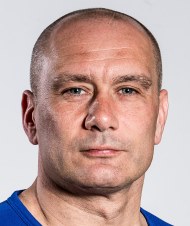 A Scottish mix of Wayne Gretzky and Gordie Howe produced Great Britain’s greatest hockey player. In the manner of Gretzky, Tony Hand recorded more than 200 points in a single British Hockey League season four times. And in the manner of Howe, Hand played in the BHL and its successors for 32 years!
A Scottish mix of Wayne Gretzky and Gordie Howe produced Great Britain’s greatest hockey player. In the manner of Gretzky, Tony Hand recorded more than 200 points in a single British Hockey League season four times. And in the manner of Howe, Hand played in the BHL and its successors for 32 years!
Starting with the Murrayfield Racers of the BHL in 1983 as a 14-year-old, Hand went on to play in the British ISL (Ice hockey Super League), the BNL (British National League), the EIHL (Elite Ice Hockey League), and, finally, the EPIHL (English Premier Ice Hockey League). By the time he retired in 2015, he was 47-years-old.
From 2001 to 2015, he was a player-coach, most notably with the Manchester Phoenix for whom he became full-time head coach in 2015 after finally retiring as a player.
Early in his career his play was so impressive that Edmonton Oilers’ general manager and coach Glen Sather, drafted Hand 252nd overall in 1986, the first British-trained player ever selected. Hand attended training camp two years running but was homesick and worried about being buried in the team’s junior system.
Internationally, Hand has the unique distinction of playing at the World Championship in A pool (1994, the last time Britain appeared at the top level), B pool / Division I (1993, 2000, 2001, 2002, 2007), C pool (1991, 1992), and D pool (1989, 1990). He also played in three U20 events (C pool) and in all played in 91 IIHF tournament games.
In 2004, Hand became the first ice hockey player ever honoured with the Member of the Order of the British Empire (MBE) by Queen Elizabeth II.
Paul Loicq Award
Patrick Francheterre
b. Lille, France, 19 November 1948
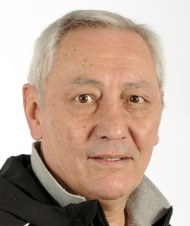
A career that started on ice, continued behind the bench, and endures to this day at the executive level, Patrick Francheterre has been involved in French hockey for the better part of half a century.
He started playing for Lille when he was 13 and joined Croix (its successor) in the pro ranks at the age of 18. At the end of his first season Francheterre played at his first World Championship, C Pool, in 1967. That fall, despite still being a teen, he was named player-coach for Croix, a position he held for the next 12 years.
Francheterre played in every World Championship for France between 1967 and 1977 (eight tournaments, all C Pool) as well as the 1968 Olympics on home ice, in Grenoble, the first time France had played in the Winter Games since 1936.
Even during his playing days, Francheterre turned to coaching. He started as an assistant in 1979 for the national U20 team, and two years later he was head coach of France’s U18 team.
In the fall of 1984, Francheterre became player-coach of the Bordeaux hockey club, and a year later he was named national team coach, a position he assumed for two seasons. In 1985, France won C Pool under his guidance, and a year later, in B Pool, the team finished fourth and has never played lower than that since.
It was only in 1988 that he retired permanently as a player.
Continuing to succeed at the executive level, Francheterre became team director for France in 1992 and three years later the assistant sports director. In 1999, he became club president of Bordeaux, a position he held for two years
It was in 2001 that he started his involvement at the IIHF level, becoming the chairman for European tournaments. He has also worked on the IIHF’s technical commission and served as the general manager for France’s hockey teams at the Olympics and World Championships, from 1993 to 1997 and again from 2004 to 2014.
Media accreditation
Media accreditation for the 2017 IIHF Ice Hockey World Championship in Cologne, Germany and Paris, France closed on 3 February 2017.
For broadcast accreditation (Radio, TV, and websites with audio/video coverage) please contact Infront Sports & Media.
To book accommodation in the media hotels, click here.
Railway tickets for media between Cologne and Paris can be booked here: from Germany, from France.
Contacts
International Ice Hockey Federation
Address Headquarters:
Brandschenkestrasse 50, Postfach 1817, 8027 Zurich, Switzerland
Tel. +41 44 562 22 00
Fax +41 44 562 22 29
E-mail Office: [email protected]
E-mail Media Relations: [email protected]
E-mail Website: [email protected]
2017 IIHF Ice Hockey World Championship Organising Committee
Address:
Betzenweg 34, 81247 Munich, Germany
Tel. +49 (0) 89 81 82 60
E-Mail Office: [email protected]
E-Mail Media: [email protected]




















































